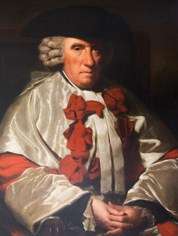John Swinton, Lord Swinton
John Swinton, Lord Swinton (1723–1799)[1] was a Scottish lawyer, judge and writer.

Life
The son of John Swinton of Swinton, Berwickshire, advocate, by his wife Mary, daughter of Samuel Semple, minister of Liberton, he was admitted advocate on 20 December 1743, Appointed sheriff-depute of Perthshire in June 1754, in April 1766 he became solicitor for renewal of leases of the bishops' tithes, and solicitor and advocate to the commissioners for plantation of kirks in Scotland.[2]
Swinton was elevated to the Scottish bench, with the title of Lord Swinton, on 21 December 1782, and, on the promotion of Lord Braxfield in 1788, was also made a lord of justiciary. He retained both appointments till his death, at his residence, Dean House, Edinburgh, on 5 January 1799.[2]
Works
Swinton published:[2]
- Abridgment of the Public Statutes relative to Scotland, &c., from the Union to the 27th of George II, 2 vols. 1755; to the 29th of George III, 3 vols. 1788–90.
- Free Disquisition concerning the Law of Entails in Scotland, 1765.
- Proposal for Uniformity of Weights and Measures in Scotland, 1779.
- Considerations concerning a Proposal for dividing the Court of Session into Classes or Chambers; and for limiting Litigation in Small Causes, and for the Revival of Jury-trial in certain Civil Actions, 1789.
Family
Swinton married Margaret, daughter of John Mitchelson of Middleton. They had six sons and seven daughters.[2]
Notes
- ↑ Ritchie, Lionel Alexander. "Swinton, John". Oxford Dictionary of National Biography (online ed.). Oxford University Press. doi:10.1093/ref:odnb/26853. (Subscription or UK public library membership required.)
- 1 2 3 4
 Lee, Sidney, ed. (1898). "Swinton, John". Dictionary of National Biography. 55. London: Smith, Elder & Co.
Lee, Sidney, ed. (1898). "Swinton, John". Dictionary of National Biography. 55. London: Smith, Elder & Co.
Attribution
![]() This article incorporates text from a publication now in the public domain: Lee, Sidney, ed. (1898). "Swinton, John". Dictionary of National Biography. 55. London: Smith, Elder & Co.
This article incorporates text from a publication now in the public domain: Lee, Sidney, ed. (1898). "Swinton, John". Dictionary of National Biography. 55. London: Smith, Elder & Co.